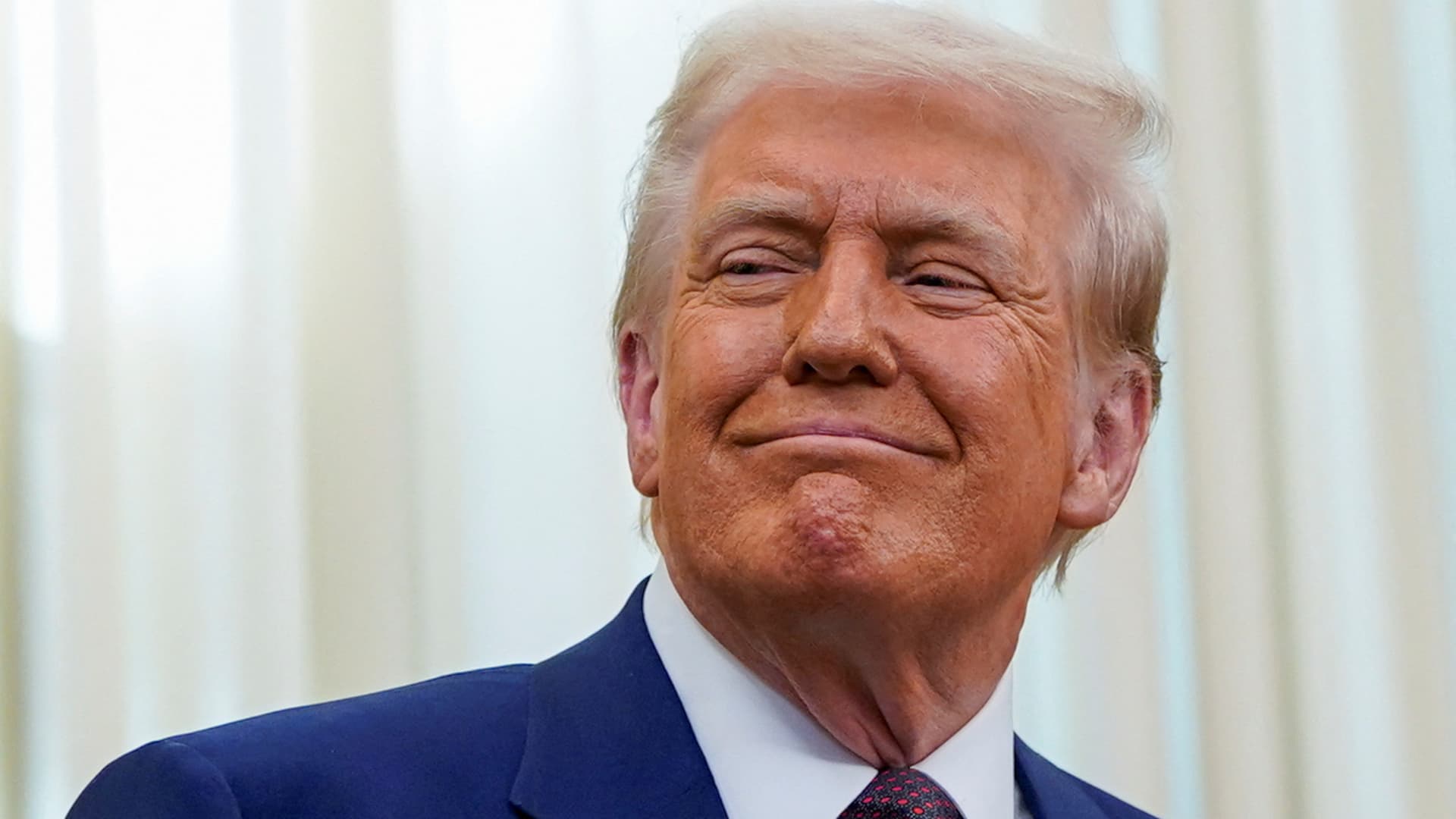U.S. President Donald Trump
Nathan Howard | Reuters
President Donald Trump and his top trade officials on Sunday added to the confusion over his administration’s tariff plans, including newly announced exemptions for reciprocal tariffs on electronic products such as phones, computers and semiconductors.
Trump and his aides suggested the exemptions — which erased added tariffs of 145% on many Chinese electronics devices and components — would be partially or completely reversed in coming weeks. A separate 20% tariff on all Chinese goods is still in effect.
The exemptions were first revealed in technical guidance issued late Friday evening without fanfare by U.S. Customs and Border Protection, and confirmed by the White House on Saturday.
But Trump on Sunday afternoon cast doubt on the duration of the exemptions, which were seen as a boon for tech companies, including Apple, which makes iPhones and most of its other products in China.
“NOBODY is getting “off the hook” for the unfair Trade Balances, and Non Monetary Tariff Barriers, that other Countries have used against us, especially not China which, by far, treats us the worst!” Trump wrote in a social media post.
“There was no Tariff “exception” announced on Friday. These products are subject to the existing 20% Fentanyl Tariffs, and they are just moving to a different Tariff ‘bucket,’ ” Trump said. “The Fake News knows this, but refuses to report it. We are taking a look at Semiconductors and the WHOLE ELECTRONICS SUPPLY CHAIN in the upcoming National Security Tariff Investigations.”
Earlier Sunday, Commerce Secretary Howard Lutnick suggested the exemptions are temporary and said that separate tariffs for electronic products are “coming soon.”
“They’re exempt from the reciprocal tariffs, but they’re included in the semiconductor tariffs, which are coming in probably a month or two,” Lutnick said on ABC News’ “This Week.”
“So this is not like a permanent sort of exemption. [Trump’s] just clarifying that these are not available to be negotiated away by countries,” he said.
Lutnick added: “These are things that are national security that we need to be made in America.”
Lutnick’s comments and Trump’s social media post throw cold water on hopes that popular tech products made in China, such as computers, laptops, smartphones, and flat-panel TVs, would be spared from Trump’s 145% reciprocal tariffs — duties that raise prices for U.S. importers and are generally passed on to consumers.
They also add more uncertainty about Trump’s tariff policy, which has changed repeatedly since he took office. Democratic lawmakers on Sunday said the changes are causing “chaos” and a crisis of credibility for Trump.
U.S. Trade Representative Jamieson Greer, in an attempt to clarify why the exemptions were made, said Sunday that they are “not really an exception,” even though the executive order Trump signed concerning the exemptions is titled in part “Clarification of Exceptions.”
“What happened is, this type of supply chain moved from the tariff regime for the global tariff, the reciprocal tariff, and it moved to the national security tariff regime,” Greer said on CBS News’ “Face the Nation.”
The reciprocal tariff exemptions initially brought a sigh of relief for major tech companies, including Apple and chipmakers like Nvidia.
But Democratic Sen. Cory Booker of New Jersey said the confusion sowed by the Trump administration’s reversal late Friday on reciprocal tariffs on some electronics from China — and his sudden call on Wednesday for a 90-day pause in enforcing new tariffs on other countries — is harmful to the U.S.
“President Trump now has a crisis in credibility,” he said in an interview Sunday on NBC News’ “Meet the Press.” “We’re hearing from around the world. People just don’t know if they can trust him.”
Sen. Elizabeth Warren, D-Mass., warned that the trade turmoil will deter businesses from investing in the U.S. “Right now what we’ve got is chaos,” she said Sunday on CNN’s “State of the Union.”
“Investors will not invest in the United States when Donald Trump is playing red light, green light with tariffs.”

